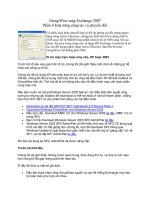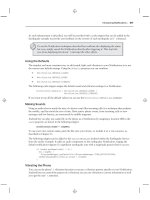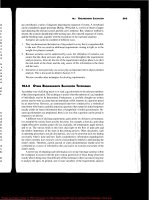Hardening Apache by Tony Mobily phần 8 ppt
Bạn đang xem bản rút gọn của tài liệu. Xem và tải ngay bản đầy đủ của tài liệu tại đây (725.84 KB, 28 trang )
# The audit's result IS different, send
# a warning email
#
#echo DEBUG: There were differences
echo "
Hello,
The result of the audit check $audit_name gave a different
result from the last time it was run.
Here is what the differences are: (from diff):
STARTS HERE STARTS HERE
$differences
ENDS HERE ENDS HERE
Here is today's result:
STARTS HERE STARTS HERE
'cat $DD/audit_check_results/$audit_name'
ENDS HERE ENDS HERE
Here is the result from last time:
STARTS HERE STARTS HERE
'cat $DD/audit_check_results/current.TMP'
ENDS HERE ENDS HERE
You may have to verify why this happened.
Yours,
audit_check
" | mail -s "audit_check: warning" $EMAIL
# The TMP file, which is the result of the
# freshly executed nikto, becomes the audit's
# last result
#
mv -f $DD/audit_check_results/current.TMP
$DD/audit_check_results/$audit_name
fi
done
exit
audit_check has a plugin-like architecture: in the same directory where the script is stored (in this case
/usr/local/bin/apache_scripts), there is a directory called audit_check.exec that contains several
executable shell scripts. Each one of them is a specific audit check, which will be used by the main script. For
example, your directory structure could look like this:
[root@merc apache_scripts]# ls -l
total 24
[ ]
-rwxr-xr-x 1 root root 1833 Aug 23 15:20 audit_check
drwxr-xr-x 2 root root 4096 Aug 23 15:24 audit_check.exec
[ ]
[root@merc apache_scripts]# ls -l audit_check.exec/
total 4
-rwxr-xr-x 1 root root 476 Aug 23 15:20 nikto
[root@merc apache_scripts]#
You should make sure that the result of the auditing script (Nikto, in this case) is the same if it's run twice on the
same system. Therefore, any time-dependent output (such as date/time) should be filtered out.
audit_check should be run once a day.
How it Works
As usual, the script sets the default information first:
DD="/var/apache_scripts_data" # Data directory
EMAIL="merc@localhost" # Alert email address
The script needs a directory called audit_check_results, where it will store the result of each scan. The
following lines make sure that such a directory exists:
if [ ! -d $DD/audit_check_results ]; then
mkdir -p $DD/audit_check_results/
fi
The script then takes into consideration each auditing plugin:
for i in $0.exec/*;do
It retrieves the plugin's name using the basename command. This information will be used later:
auditd_name='basename $i'
The script then executes the plugin, storing the result in a temporary file:
$i >$DD/audit_check_results/current.TMP
The difference between this scan and a previous scan is obtained with the diff command, whose result is stored
in the variable $differences:
if [ ! -f $DD/audit_check_results/$audit_name ];then
> $DD/audit_check_results/$audit_name
fi
differences='diff $DD/audit_check_results/current.TMP
$DD/audit_check_results/$audit_name'
Note that it is assumed that the output of a previous scan was stored in a file called $audit_name in the directory
$DD/audit_check_results; if such a file doesn't exist, it is created before running the diff command.
If the variable difference is not empty, a detailed e-mail is sent to $EMAIL:
if [ "foo$differences" != "foo" ];then
echo" Hello, the result of the audit check $audit_name [ ] " | mail -s
"audit_check: warning" $EMAIL
The e-mail's body contains the differences between the two scans and the two dissimilar scans.
If there are differences, the most recent scan becomes the official scan: the old one is overwritten using the mv
command:
mv -f $DD/audit_check_results/current.TMP $DD/audit_check_results/$audit_name
All these instructions are repeated for every script in the directory audit_check.exec. You can place all the tests
you could possibly want to run there, with one condition: the output must be the same if the result is the same.
Before starting the auditing check, for example, Nikto prints this on the screen:
[root@merc nikto-1.30]# ./nikto.pl -h localhost
- Nikto 1.30/1.15 - www.cirt.net
+ Target IP: 127.0.0.1
+ Target Hostname: localhost
+ Target Port: 80
+ Start Time: Sat Aug 23 18:27:42 2003
At the end of the check, it prints:
+ End Time: Sat Aug 23 18:31:13 2003 (145 seconds)
[root@merc nikto-1.30]#
Your audit_check.exec/nikto script will need to filter out these lines. Assuming that Nikto is installed in
/usr/local/nikto-1.30, your script should look like this:
# Go to Nikto's directory
#
cd /usr/local/nikto-1.30/
# Run nikto, taking out the "Start Time:" and "End Time" lines
#
#./nikto.pl -h localhost | grep -v "^+ Start Time:" | grep -v "^+ End Time:"
log_size_check
The log_size_check script, shown in Listing 7-4, is used to monitor the log directories. If a log directory listed in
$LOG_DIRS exceeds a specific size ($MAX_SIZE kilobytes), or if it grows faster than normal ($MAX_GROWTH
kilobytes), an alarm e-mail is sent to $EMAIL.
Listing 7-4: The Source Code of log_size_check
#!/bin/bash
###############################################
# NOTE: in this script, the MAX_DELTA variable
# depends on how often the script is called.
# If it's called every hour, a warning will be
# issued if the log file's size increases by
# MAX_DELTA in an hour. Remember to change MAX_DELTA
# if you change how often the script is called
###############################################
###################
# Script settings
###################
#
DD="/var/apache_scripts_data" # Data directory
EMAIL="merc@localhost" # E-mail address for warnings
#
LOGS_DIRS="/usr/local/apache1/logs \
/usr/local/apache2/logs/*/logs"
MAX_GROWTH=500 # Maximum growth in K
MAX_SIZE=16000 # Maximum size in K
for i in $LOGS_DIRS;do
#echo DEBUG: Now analysing $i
# This will make sure that there is
# ALWAYS a number in log_size_last,
# even if $DD/$i/log_size_last doesn't
# exist
#
if [ ! -f $DD/log_size_subdirs/$i/log_size_last ]; then
log_size_last=0
#echo DEBUG: Previous file not found
else
log_size_last='cat $DD/log_size_subdirs/$i/log_size_last'
#echo DEBUG: file found
#echo DEBUG: Last time I checked, the size was $log_size_last
fi
# Find out what the size was last time
# the script was run. The following command
# reads the last field (cut -f 1) of the last
# line (tail -n 1) of the du command. In "du"
# -c gives a total on the last line, and -k
# counts in kilobytes. To test it, run first
# du by itself, and then add tail and cut
#
size='du -ck $i | tail -n 1 | cut -f 1'
# Paranoid trick, so that there is always a number there
#
size='expr $size + 0'
#echo DEBUG: size for $i is $size
# Write the new size onto the log_size_last file
#
mkdir -p $DD/log_size_subdirs/$i
echo $size > $DD/log_size_subdirs/$i/log_size_last
# Find out what the difference is from last
# time the script was run
#
growth='expr $size - $log_size_last'
#echo DEBUG: Difference: $growth
# Check the growth
#
if [ $growth -ge $MAX_GROWTH ];then
echo "
Hello,
The directory $i has grown very quickly ($growth K).
Last time I checked, it was $log_size_last K. Now it is $size K.
You might want to check if everything is OK!
Yours,
log_size_check
" | mail -s "log_size_check: growth warning" $EMAIL
#echo DEBUG: ALARM GROWTH
fi
if [ $size -ge $MAX_SIZE ];then
echo "
Hello,
The directory $i has exceeded its size limit.
Its current size is $size K, which is more than $MAX_SIZE K,
You might want to check if everything is OK!
Yours,
log_size_check
" | mail -s "log_size_check: size warning" $EMAIL
#echo DEBUG: ALARM SIZE
fi
#echo DEBUG:
done
The frequency at which you run this script is very important, because it affects the meaning of the variable
$MAX_GROWTH. If the script is run once every hour, a log directory will be allowed to grow at $MAX_GROWTH per
hour; if it's run once every two hours, the logs will be allowed to grow $MAX_GROWTH every two hours, and so on.
Unlike the other scripts, this one doesn't have a maximum number of warnings. I would advise you to run this script
once every hour.
How it Works
The script starts by setting the default information:
DD="/var/apache_scripts_data"
EMAIL="merc@localhost"
Then, the extra information is set:
LOGS_DIRS="/usr/local/apache1/logs /usr/local/apache2/logs/*/logs"
MAX_GROWTH=500
MAX_SIZE=16000
The most interesting variable is $LOG_DIRS, which sets what directories will be checked. In this case, if you had
the directories domain1/logs and domain2/logs in /usr/local/apache2/logs, the variable $LOG_DIRS
would end up with the following values:
/usr/local/apache1/logs /usr/local/apache2/logs/domain1/logs
/usr/local/apache2/logs/domain2/logs
This happens thanks to the expansion mechanism of bash, which is especially handy if you are dealing with many
virtual domains, each one with a different log directory. The following line cycles through every log directory:
for i in $LOGS_DIRS;do
The next lines are used to check how big the considered directory was when the script was last run, setting the
variable log_size_last. Note that if the file didn't exist, the variable log_size_last is set anyway (thanks to
the if statement):
if [ ! -f $DD/log_size_subdirs/$i/log_size_last ]; then
log_size_last=0
else
log_size_last='cat $DD/log_size_subdirs/$i/log_size_last'
fi
The strings $DD/log_size_subdirs/$i/log_size_last needs explaining: when $i (the currently analyzed
log directory) is /usr/local/apache2/logs/domain1/logs, for example,
$DD/log_size_subdirs/$i/log_size_last is:
/var/apache_scripts_data/log_size_subdirs/usr/local/apache2/logs/domain1/logs/
log_size_last
This is the trick used by this shell script: /var/apache_scripts_data/log_size_subdir contains a
subdirectory that corresponds to the full path of the checked directory. This subfolder will in turn contain the file
log_size_last. This will guarantee that for every checked directory there is a specific file, which will hold the
size information for it.
The script finds out the current size of the considered log directory thanks to a mix of du, tail, and cut
commands:
size='du -ck $i | tail -n 1 | cut -f 1'
size='expr $size + 0'
The command size='expr $size + 0' is a paranoid check I used to make absolutely sure that the script
works even if for some reason $size doesn't contain a number, or if it's empty.
The du command, when used with the -c option, returns the total size of a directory in the last line of its output.
The command tail -n 1 only prints out the last line (the one you are interested in) of its standard input. Finally,
the cut command only prints the first field of its standard input (the actual number) leaving out the word "total." The
result is a number, which is assigned to the variable size.
The next step is to refresh $DD/log_size_subdirs/$i/log_size_last with the new size:
mkdir -p $DD/log_size_subdirs/$i
echo $size > $DD/log_size_subdirs/$i/log_size_last
The script finally calculates the relative growth:
growth='expr $size - $log_size_last'
If the growth exceeds $MAX_GROWTH, a warning e-mail is sent:
if [ $growth -ge $MAX_GROWTH ];then
echo "Hello, the directory $i has grown [ ]" | mail -s "log_size_check:
growth warning" $EMAIL
If the log directory's size exceeds $MAX_SIZE, a warning e-mail is sent:
if [ $size -ge $MAX_SIZE ];then
echo "Hello, $i has exceeded its size limit. [ ] " | mail -s
"log_size_check: size warning" $EMAIL
This is repeated for each directory in $LOG_DIRS.
Note
This script may suffer from the same problems as CPU_load: if the file system is full, the mail agent might
not be able to send you the e-mail. In this case, having a separate file system for your server's logs is
probably enough to enjoy some peace of mind.
log_content_check
The log_content_check script, shown in Listing 7-5, checks the content of the log files using specified regular
expressions. If anything suspicious is found, the result is mailed to $EMAIL.
Listing 7-5: The Source Code of log_content_check
#!/bin/bash
###################
# Script settings
###################
#
DD="/var/apache_scripts_data" # Data directory
EMAIL="merc@localhost" # Email address for warnings
#
# Prepare the log_content_check file
#
cp -f /dev/null $DD/log_content_check_sum.tmp
# For every configuration file
# (e.g. log_content_check.conf/error_log.conf
#
for conf in $0.conf/*.conf;do
#echo DEBUG: Config file $conf open
# For each file to check
#
for file_to_check in 'cat $conf';do
#echo DEBUG: File to check: $file_to_check
# And for every string to check for THAT conf file
# (e.g. log_content_check.conf/error_log.conf.str)
#
cp -f /dev/null $DD/log_content_check.tmp
for bad_string in 'cat $conf.str';do
#echo DEBUG: Looking for -$bad_string-
# Look for the "bad" strings, and store
# them in log_content_check.tmp
#
cat $file_to_check | urldecode | grep -n $bad_string >>
$DD/log_content_check.tmp
done
# If something was found,
# append it to the summary
#
if [ -s $DD/log_content_check.tmp ];then
echo "In file $file_to_check" >>
$DD/log_content_check_sum.tmp
echo " START " >>
$DD/log_content_check_sum.tmp
cat $DD/log_content_check.tmp >>
$DD/log_content_check_sum.tmp
echo " END " >>
$DD/log_content_check_sum.tmp
echo >>
$DD/log_content_check_sum.tmp
fi
done
done
if [ -s $DD/log_content_check_sum.tmp ];then
#echo DEBUG: there is danger in the logs
echo "
Hello,
There seems to be something dangerous in your log files.
Here is what was found:
'cat $DD/log_content_check_sum.tmp'
You may have to verify why.
Yours,
log_content_check
" | mail -s "log_content_check: warning" $EMAIL
fi
# Cleanup
#
rm -f $DD/log_content_check.tmp
rm -f $DD/log_content_check_sum.tmp
exit
The configuration for log_content_check is stored in a directory called log_content_check.conf, placed
where the script is. log_content_check.conf can contain several pairs of configuration files. A typical example
could be:
[root@merc log_content_check.conf]# ls -l
total 16
-rw-r r 1 root root 70 Aug 24 11:15 access_log.conf
-rw-r r 1 root root 7 Aug 24 11:15 access_log.conf.str
-rw-r r 1 root root 68 Aug 24 11:15 error_log.conf
-rw-r r 1 root root 14 Aug 24 11:15 error_log.conf.str
[root@merc log_content_check.conf]#
The file access_log.conf contains a list of files that will be searched. For example:
[root@merc log_content_check.conf]# cat access_log.conf
/usr/local/apache2/logs/access_log
/usr/local/apache1/logs/access_log
[root@merc log_content_check.conf]#
In the same directory, for each .conf file there is a .str file that lists what to look for:
[root@merc log_content_check.conf]# cat access_log.conf.str
webcgi
second_problem
third_string
[root@merc log_content_check.conf]#
You can have several .conf files, as long as there is a corresponding .str file for each one of them.
The frequency at which you run this script depends on how the logging is set up for your system. You basically
have to run it as often as possible, but also make sure that you don't check the same logs twice. You could run it
once a day, when you archive your log files; if your logs are on a database, you can run it every five minutes, using
a script that only fetches the new entries.
How It Works
Like any other script, the first two lines set the default information:
DD="/var/apache_scripts_data"
EMAIL="merc@localhost"
The core part of the script adds any dangerous information to a file called log_content_check_sum.tmp. The
first step is then to make sure that the file is empty:
cp –f /dev/null $DD/log_content_check_sum.tmp
Then, the code follows three nested cycles. The first one repeats for each .conf file in
log_content_check.conf, storing the configuration file's name in a variable called $conf:
for conf in $0.conf/*.conf;do
Each .conf file is read, and the next cycle is repeated for each file listed in it:
for file_to_check in 'cat $conf';do
Before the next cycle starts, a temporary file called log_content_check.tmp is emptied. The reasons will be
clear shortly:
cp –f /dev/null $DD/log_content_check.tmp
The script now has to check $file_to_check against every string specified in the file $conf.str. For example,
if the configuration file considered by the first for cycle was access_log.conf, the next cycle will go through
every line contained in access_log.conf.str:
for bad_string in 'cat $conf.str';do
Then, the file $file_to_check is checked against each string contained in $bad_string. The result is stored in
the temporary file log_content_check.tmp, which had been emptied earlier:
cat $file_to_check | urldecode | grep -n $bad_string >>
$DD/log_content_check.tmp
done
The done instruction marks the end of the cycle. After checking $file_to_check against every $bad_string,
the script checks the size of log_content_check.tmp; if it is not empty, it means that some of the grep
commands did find something. Therefore, the relevant information is added to the check summary file
$log_content_check_sum:
if [ -s $DD/log_content_check.tmp ];then
echo "In file $file_to_check" >>
$DD/log_content_check_sum.tmp
echo " START " >>
$DD/log_content_check_sum.tmp
cat $DD/log_content_check.tmp >>
$DD/log_content_check_sum.tmp
echo " END " >>
$DD/log_content_check_sum.tmp
echo >>
$DD/log_content_check_sum.tmp
fi
The next two lines close the two main cycles:
done
done
At this point, if the file log_content_check_sum.tmp is not empty (some dangerous strings were found on some
of the checked log files), its content is e-mailed to $EMAIL as a warning:
if [ -s $DD/log_content_check_sum.tmp ];then
echo " Hello, there seem to be [ ] Yours, [ ] " | mail -s
"log_content_check: warning" $EMAIL
fi
Finally, the script cleans up the temporary files it created:
rm -f $DD/log_content_check.tmp
rm -f $DD/log_content_check_sum.tmp
In order to work, the script needs a program called urldecode in the PATH. I introduced this useful script in
Chapter 3. This is what it could look like:
#!/usr/bin/perl
use URI::Escape;
use strict;
# Declare some variables
#
my($space)="%20";
my($str,$result);
# The cycle that reads
# the standard input
while(<>){
# The URL is split, so that you have the
# actual PATH and the query string in two
# different variables. If you have
# /> # $path = " /> # $qstring = "query=this"
my ($path, $qstring) = split(/\?/, $_, 2);
# If there is no query string, the result string
# will be the path
$result = $path;
# BUT! If the query string is not empty, it needs
# some processing so that the "+" becomes "%20"!
if($qstring ne ""){
$qstring =~ s/\+/$space/ego;
$result .= "?$qstring";
}
# The string is finally unescaped
$str = uri_unescape($result);
# and printed!
print($str);
}
If you don't decode your log files before reading them, you might (and probably will) miss some URL-encoded
malicious strings.
block
The goal of this simple script, block, shown in Listing 7-6, is to block a specific address by changing Apache's
configuration file and restarting Apache.
Listing 7-6: The Source Code of block
#!/bin/bash
# Your Apache configuration file should have
# something like:
#
# Include extra.conf (or whatever $CONF is)
#
# TOWARDS THE END, so that <Location> is interpreted last
###################
# Script settings
###################
#
CONF="/usr/local/apache2/conf/extra.conf"
APACHECTL="/usr/local/apache2/bin/apachectl"
#
# Check that there IS a parameter
#
if [ foo$1 = foo ];then
echo Usage: $0 IP
exit
fi
# Check the parameter's format
#
good='echo $1|grep "^[0-9]\{1,3\}\.[0-9]\{1,3\}\.[0-9]\{1,3\}\.[0-9]\{1,3\}$"'
if [ foo$good = foo ];then
echo Incorrect IP format. The IP should be n.n.n.n,
echo where n is a number. E.g. 151.99.444.55
exit
fi
echo "
# This entry was added automatically
# to block $1
#
<Location />
Order Allow,Deny
Allow from All
Deny from $1
</Location>
" >> $CONF
echo Entry added to $CONF
# Stopping and restarting Apache
#
echo Stopping Apache
$APACHECTL stop
echo Starting Apache
$APACHECTL start
exit
This script can be used by anyone with root access to the server, and can therefore be used in case of emergency
if the senior system administrator is not available immediately at the time of the attack.
Here is an example:
[root@merc root]# /usr/local/bin/apache_scripts/block 151.99.247.3
Entry added to /usr/local/apache2/conf/extra.conf
Stopping Apache
Starting Apache
[root@merc root]#
How It Works
The script's first lines set two environment variables, to specify where Apache's configuration file is, and what the
apachectl command that stops and restarts Apache is:
CONF="/usr/local/apache2/conf/extra.conf"
APACHECTL="/usr/local/apache2/bin/apachectl"
The script checks if a parameter was provided:
if [ foo$1 = foo ];then
echo Usage: $0 IP
exit
fi
The next line checks if the parameter provided is actually an IP address, using a regular expression:
good='echo $1|grep "^[0-9]\{1,3\}\.[0-9]\{1,3\}\.[0-9]\{1,3\}\.[0-9]\{1,3\}$"'
The string [0-9] means "any number," \{1,3\} means "1 to 3 of" (a minimum of one and a maximum of three),
and \. indicates a period. If the string provided is a valid IP address (that is, if it contains four sets of numbers
separated by periods), then grep will print it, and therefore the variable good will not be empty.
Note
This regular expression only works for IPv4 addresses.
Otherwise, an error message is displayed:
if [ foo$good = foo ];then
echo Incorrect IP format. The IP should be n.n.n.n,
echo where n is a number. E.g. 151.99.444.55
exit
fi
The script then appends the right configuration options to $CONF:
echo "
# This entry was added automatically
# to block $1
#
<Location />
Order Allow,Deny
Allow from All
Deny from $1
</Location>
" >> $CONF
echo Entry added to $CONF
Finally, Apache is stopped and restarted:
echo Stopping Apache
$APACHECTL stop
echo Starting Apache
$APACHECTL start
It is a good idea not to directly modify httpd.conf; instead, you can append these options to a file called
extra.conf (as in this case), and add the following in your httpd.conf:
Include conf/extra.conf
Running the Scripts Automatically
When you have to run a program periodically, the most common choice in Unix is crontab. Unfortunately, such a
choice is not feasible for these scripts. Some of them should be run every 5 or 10 seconds, and crontab cannot
run a task more frequently than once every one minute. The easiest solution is writing a simple script that does it for
you. Listing 7-7 shows the code of this script, called RUNNER.
Listing 7-7: The source code of RUNNER
#!/bin/bash
# Where the scripts are
SCRIPTS=/usr/local/bin/apache_scripts
LOG_DIR=/var/log/apache_scripts
# How every program is run
#
run_it(){
$SCRIPTS/$1 >$LOG_DIR/$1.log 2>&1 &
}
# The fun starts now
# REMEMBER That this scripts sleeps for
# 1 second. Therefore, each cycle will
# last a little longer than 1 second!
#
i=0
while [ 1 ];do
# Sleep for 1 second
#
sleep 1
i='expr $i + 1'
# Heartbeat for debugging purposes
#
echo DEBUG: $i
# Every 5 seconds
# If $i divided by 5 has a reminder,
# then $i is not a multiple of 5
#
if [ 'expr $i \% 5' = 0 ];then
echo DEBUG: running apache_alive and CPU_load
run_it apache_alive
run_it CPU_load
fi
# Every 3600 seconds (1 hour)
#
if [ 'expr $i \% 3600' = 0 ];then
echo DEBUG: running log_size_check
log_size_check
fi
# Every 86400 seconds (1 day)
#
if [ 'expr $i \% 86400' = 0 ];then
echo DEBUG: running audit_check
audit_check
fi
done
The script starts with the usual initialization:
SCRIPTS=/usr/local/bin/apache_scripts
LOG_DIR=/var/log/apache_scripts
Then, a bash function called run_it is defined. It simply runs the script passed as an argument, redirecting its
standard input and standard output to a log file:
run_it(){
$SCRIPTS/$1 >$LOG_DIR/$1.log 2>&1 &
}
Then the script enters a perpetual cycle, where the variable $i is increased on each iteration and waits one
second:
i=0
while [ 1 ];do
i='expr $i + 1'
sleep 1
The next portion of the script runs the scripts apache_alive and CPU_load every five iterations:
if [ 'expr $i \% 5' = 0 ];then
run_it apache_alive
run_it CPU_load
fi
The instructions within the if statement are only repeated if $i is a multiple of 5 (that is, if the remainder of $i
divided by 5 is 0; in expr, the % operation gives you a division's reminder).
The same applies to log_size_check (run every hour, or 3,600 seconds) and audit_check (run every day, or
86,400 seconds):
if [ 'expr $i \% 3600' = 0 ];then
echo DEBUG: running log_size_check
log_size_check
fi
if [ 'expr $i \% 86400' = 0 ];then
echo DEBUG: running audit_check
audit_check
fi
done
Note that this script is slightly inaccurate: it waits one second, and then executes some operations. This means that
every iteration will last at least slightly more than one second. On production servers, it is probably a good idea to
restart this script once a week using crontab.
Note
You should be careful when you code the scripts called by RUNNER: if any of the scripts hang, the process
table can fill up very quickly.
Checkpoints
Automate server administration as much as possible, writing scripts that monitor your server for security
problems.
Read the messages and warnings generated by your scripts. It's vital that there is a capable system
administrator able to read and understand these messages, and act upon them, without discarding them as the
"usual automatic nag from the scripts."
Keep the scripts simple. Remember that they are only scripts—you are allowed to code them without applying
the important concepts of software engineering.
Make sure that the scripts only generate warning e-mails (or messages) if there is a real need for them.
Whenever possible, interface your scripts with other existing monitoring tools (like Big Brother,
).
Appendix A: Apache Resources
This appendix contains a list of resources that any system administrator should be aware of. These resources are
mainly focused on Apache and web servers in general.
Vulnerability Scanners and Searching Tools
Insecure.org's top 75 Security Tools ( A valuable resource
that lists the most important security programs available today.
Nikto ( A powerful, free web server scanner.
Nessus (). Probably the best known and most powerful vulnerability assessment
tool existing today.
SARA ( A free assessment tool derived from SATAN.
SAINT ( A commercial
assessment tool for Unix.
Advisories and Vulnerability Resources
Apache Week ( A newsletter on Apache. Its security section
( is very important.
CVE: Common Vulnerabilities Exposure ( A list of standardized names for
vulnerabilities and other information security exposures. Every Apache vulnerability has a CVE entry.
CERT (). A center of Internet security expertise located at the Software Engineering
Institute, a federally funded research and development center operated by Carnegie Mellon University. They
often provide important information and advisories on Apache's vulnerabilities.
BugTraq ( An important mailing list focused on computer
security.
VulnWatch (). A "non-discussion, non-patch, all-vulnerability announcement
list supported and run by a community of volunteer moderators distributed around the world." Its archives are
on />PacketStorm ( "A non-profit organization comprised of security
professionals dedicated to providing the information necessary to secure the World's networks. We accomplish
this goal by publishing new security information on a worldwide network of websites."
SecuriTeam ( SecuriTeam is a small group within Beyond Security
( dedicated to bringing you the latest news and utilities in computer
security. It contains relevant information on Apache, as well as exploits.
X-Force ISS ( X-Force is ISS's team of researchers,
who keep a database of vulnerabilities compatible with CVE in their naming convention. ISS (Internet Security
Systems, ) is a company that provides security products.
Security Tracker ( A site that keeps track of vulnerabilities. It's not
focused on Apache, but contains relevant information and advisories.
Security.nnov ( A Russian site that lists many known vulnerabilities
and provides many exploits.
Georgi Guninski ( Guninski's web site is important because it lists all those
web browser vulnerabilities that make XSS attacks dangerous. He provides an exploit for every vulnerability.
Note
Several of these companies have vested commercial interest in security issues; as a consequence, their
information may not be objective or timely.
HTTP Protocol Information
RFC 2616 ( The RFC of Hypertext Transfer Protocol 1.1.
RFC 2396 ( Generic Syntax for Uniform Resource Identifiers
(URI).
RFC 2045 ( MIME types.
IANA MIME types ( The officially
registered MIME types.
Unicode ( The official web site for Unicode.
HTML entities ( The official list of HTML entities.
RFC 1738 ( The RFC for Uniform Resource Locators.
Vendors
This is not meant to be a comprehensive list of vendors. Its goal is to simply show that most (if not all) major
vendors do have a public page where you can download system updates and bulletins.
FreeBSD: />Mac OS X: />OpenBSD: />NetBSD: />Linux, Red Hat: />Linux, Debian: />Linux, Gentoo: />Sun: />Microsoft: />









